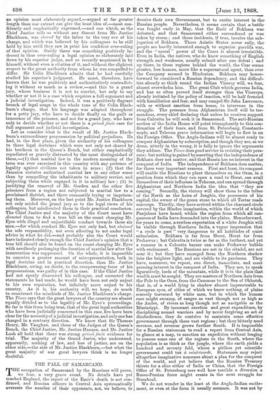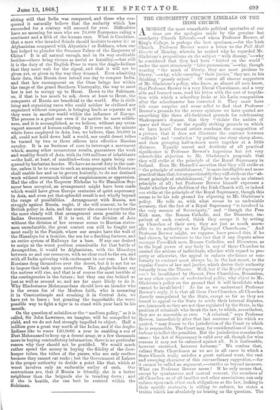THE FALL OF SAMARCAND.
THE occupation of Samarcand by the Russians will prove, we fear, a very grave event. No details have yet reached England, the report of the Emir's death is not con- firmed, and Russian officers in Central Asia systematically overrate the number of their opponents, not, we believe, to deceive their own Government, but to excite interest in the Russian people. Nevertheless, it seems certain that a battle was fought early in May, that the Emir of Bokhara was defeated, and that Samarcand either surrendered or was taken by storm ; and those incidents, if true, involve the sub- jugation of Bokhara. These Asiatic States never rally, the- people are hardly interested enough to organize guerilla war, and the " moral " power of the Czars is almost irresistible. Even in India, the natives, who do know something of Englisk strength and weakness, usually submit after one defeat ; and, up there, in those regions behind the world, the Czar seems- greater, less human, more like a supernatural agent, than ever the Company seemed in Hindostan. Bokhara may hence- forward be considered a Russian dependency, and the difficul- ties already so thick round the Indian Viceroy will, we fear, almost overwhelm him. The great Club which governs India, and has so often proved itself stronger than the Viceroys, already irritated by the policy of inaction, will be half frenzied with humiliation and fear, and may compel Sir John Lawrence, with or without sanction from home, to intervene in the- struggle. The pressure from Afghanistan itself will be tre- mendous, every chief declaring that unless he receives support from Calcutta he will seek it in Samarcand. The anti-Russian section of the India House will point triumphantly to this con- firmation of their fears, and from St. Petersburg, Constanti- nople, and Teheran grave information will begin to flow in on the Foreign Office. The Anglo-Indians will be almost ready to conquer Afghanistan by subscription, and though they are, as we deem, utterly in the wrong, it is folly to ignore the arguments- they adduce. The Times does good service in resisting their pres- sure; but nothing is gained by asserting that the independence of Bokhara does not matter, and that Russia has no interest in the- conquest of India. The independence of Bokhara does matter, for three very important reasons. First and least, its conquest will enable the Russians to plant themselves on the Oxus, in a position from which they can open a road to Herat, can avail themselves of their influence in Teheran, and can spread through Afghanistan and Northern India the idea that "they are- coming." Secondly, the victory will show them to the tribes of the North as the heirs of Jenghiz, the possessors of his capital, the owner of the green stone to which all Tartar roads converge. Thirdly, they have arrived within the charmed circle covered by the Hindoo imagination, within the world of which Punjabees have heard, within the region from which all con- querors of India have descended into the plains. Henceforward, for years to come, a restless expectation of a white Jenghiz will be visible through Northern India, a vague impression that "a cycle is past" very dangerous to all habitudes of quiet submission. Bokhara is far from Herat, Herat far from Peshawur ; but Calcutta is twice as far as the farthest, and yet a rumour in a Calcutta bazaar can make Peshawar bubble- with excitement. The Russians are not in the citadel, are not near it ; but they have emerged from the Northern shadow into the brighter light, and are visible to its garrisons. They- have, moreover, we repeat, one direct, immediate, and most pressing interest in the conquest of India. They are, to speak figuratively, lords of the mountain, while it is in the plain that wealth must be sought. They are masters of Northern Asia from the Pole to the Oxus, from the Caucasus to the Sea of Okhotsk, that is, of a world lying in shadow almost impenetrable to- European eyes, of cities of which we know nothing, of plains- scarcely traversed by white men, but in which the human race might encamp, of ranges as vast though not as high as- the Andes, of rivers as long though not as navigable as the- Mississippi. By incessant exertion and great expenditure, by disciplining nomad warriors and by never forgiving an act of disobedience, they do contrive to maintain some effective- government through these vast regions ; bat they bitterly need revenue, and revenue grows further South. It is impossible for a Russian statesman to read a report from Central Asia, to glance at a map, to sanction an expedition without longing- to possess some one of the regions to the South, where the- population is as thick as the jungle, where the earth yields a hundred and seventy fold, where a pitiless yet scientific government could tax d misericorde. Statesmen may reject altogether imaginative nonsense about a plan for the conquest of the world, and yet believe that the Russian Treasury thirsts for a slice either of India or China, that the Foreign, Office of St. Petersburg sees well how terrible a diversion a Russo-Persian force might create in the next struggle for
Stamboul. • We do not wonder in the least at the Anglo-Indian excite- ment, or even at the form it usually assumes. It was not by sitting still that India was conquered, and those who con- quered it naturally believe that the audacity which has succeeded for a century will succeed for ever. Difficulties have no meaning for men who see 70,000 Europeans ruling a continent and a fifth of the human race. What is Candahar, that a man who invaded Scinde should hesitate to enter it? or Afghanistan compared with Abyssinia? or Bokhara, when one has helped to plunder the Slimmer Palace of the Emperors of China It is all natural enough, and in its way creditable besides—there being virtues as useful as humility,—but still it is the duty of the English Press to warn the Anglo-Indians that they must wait for the signal, and that it will not be given yet, or given in the way they demand. Even admitting their data, that Russia does intend one day to conquer India, and that her encampment on the Oxus brings her within the range of the grand Southern Viceroyalty, the way to meet her is not to occupy up to Herat. Down to the Suleiman, or, if that is too much to ask, down at least to Herat, the conquests of Russia are beneficial to the world. She is civil- izing and organizing races who could neither be civilized nor organized without conquest, is bringing lands as separate as if they were in another world within the influence of Europe. The process is a good one even if its motive be mere selfish- ness, and it is accomplished, as we believe, without any extra- vagant amount of human suffering. If it were not, the minute white force employed in Asia, less, we believe, than 50,000 in all, could not hold down half a world, nor could desert tribes be turned by two or three officers into effective Russian cavalry. It is no business of ours to interrupt a movement which, among other momentous results, guarantees the weak and wealthy South of Asia, with its 500 millions of inhabitants —the half, at least, of mankind—from ever again being con- quered by barbarian hordes. We have no moral duty in the mat- ter, unless it be to come to such an arrangement with Russia as shall enable her and us to govern leniently, to do our destined 'work without overmuch either of suspiciousness or oppression. Had the offer of the Emperor Nicholas to Sir Hamilton Sey- mour been accepted, an arrangement might have been made which would have given Europe centuries of quiet supremacy in Asia, and even yet that splendid result is not wholly beyond the range of possibilities. Arrangement with Russia, not struggle against Russia, ought, if she will consent, to be the British policy in Asia, and the nearer she comes to our frontier the more clearly will that arrangement seem possible to the Indian Government. If it is not, if the division of Asia without the division of her revenue seems to Russian states- men unendurable, the great contest can still be fought out most easily in the Punjab, where our armies have the wall of the Himalaya for a frontier, the sea for a flanking fortress, and an entire system of Railways for a base. If any one desired to assign us the worst position conceivable for that battle of Armageddon, it would be Afghanistan, with the Himalaya between us and our resources, with no clear road to the sea, and with all India quivering with excitement in our rear. Let the Russians drag themselves over the desert, but it is not for us to impose that task upon ourselves. The Anglo-Indians say the natives will rise, and that is of course the most terrible of the contingencies in the future ; but they can rise behind us just as well as around us, and are far more likely to do it. Why Hindostanee Mohammedans should love an invader who is the sworn foe of the Moslem faith, who is menacing it in Constantinople and crushing it in Central Asia, we have yet to learn ; but granting the improbable, the worst possible way to fight a tiger is to stand with your back lo his mouth.
On the question of subsidies or the "medium policy," as it is called, Sir John Lawrence, we imagine, will be compelled to yield, and we do not feel strongly impelled to object. Half a million goes a great way north of the Indus, and if the Anglo- Indians like to waste 120,000/. a year in enabling a son of Dost Mohammed to keep up a decent army, or a few thousands more in buying contradictory information, there is no particular reason why they should not be gratified. We would much rather spend the money in buying the fidelity of the door- keeper tribes, the tribes of the passes, who are only restless because they cannot eat rocks ; but the Government of Lahore is the proper authority to decide a point like that, which at worst involves only an endurable outlay of cash. Our contentions are, that if Russia is friendly, she is a better neighbour than the brigands she is treading down ; and if she is hostile, she can best be resisted within the Suleiman































 Previous page
Previous page